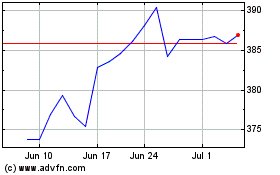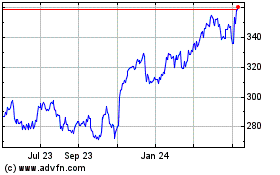UPDATE: Google Agrees To Buy Motorola Mobility For $12.5 Billion
August 15 2011 - 9:15AM
Dow Jones News
Google Inc. (GOOG) agreed to acquire Motorola Mobility Holdings
Inc. (MMI) for about $12.5 billion, giving the developer of the
Android mobile operating system its own handset maker and some key
patent protection.
The deal would help Google compete more directly with Apple Inc.
(AAPL), while stepping up the pressure on Research in Motion Ltd.
(RIMM, RIM.T) and Nokia Corp. (NOK, NOK1V.HE). Google also gets
access to Motorola's patent trove at a time of increasing demand
for intellectual property involving mobile devices.
Meanwhile, the acquisition makes rivals out of some Google
partners that license its Android operating system, raising
questions about the way Google will operate that business.
Motorola Mobility shares soared 59% to $38.80 premarket,
approaching the offer price of $40 a share, which is a 63% premium
to its Friday close. Google shares were down 2.8% to $547.80.
Google expects to complete the transaction by early 2012, and
it's been approved by the boards of both companies. The deal has a
breakup fee of $2.5 billion in cash, according to The Wall Street
Journal. The hefty amount may indicate some nervousness about the
deal's regulatory prospects as Google has raised antitrust concerns
with the Department of Justice.
Google, which owns the fast-growing Android operating system
used in millions of mobile phones, has a thin portfolio of wireless
and telecommunications patents.
It recently lost the bidding for Nortel Networks Corp.'s (NRTLQ)
patent trove to a consortium of tech heavyweights such as Apple
Inc. (AAPL) and Microsoft Corp. (MSFT). Meanwhile, Google and
Microsoft have engaged in a war of words over their recent
maneuvers in intellectual property auctions, underlining the heated
tone of the market for such assets.
"The big thing it plugs for Google is: Google's patent portfolio
is only a few thousand, and they have been the target of a
significant amount of patent litigation," Evercore Partners analyst
Alkesh Shah said. "Motorola's patent portfolio provides a very
strong defense against all this litigation."
Google will run Motorola Mobility as a separate business that
will remain a licensee of Android. It was not clear how the deal
will affect Google's relationship with other Android partners,
specifically HTC Corp. (2498.TW), LG Electronics Inc. (066570.SE)
and Samsung Electronics Co. (005930.SE). In its press release,
Google said things wouldn't be different.
"Our vision for Android is unchanged, and Google remains firmly
committed to Android as an open platform and a vibrant open source
community," said Andy Rubin, Google's senior vice president of
mobile at Google. "We will continue to work with all of our valued
Android partners to develop and distribute innovative
Android-powered devices."
Others, though were more skeptical. "I think this is their early
attempt to replicate Apple's business model," Morgan Keegan analyst
Tavis McCourt said on CNBC.
Increased sales of devices running the free Android software
have given Taiwan's HTC and South Korea's Samsung a shot in the arm
after losing market share to Apple's iPhone handset. All three
manufacturers, including LG, have said this year they will be
boosting the output of Android-based devices.
Samsung and LG declined to provide an immediate comment; HTC
said it will make a statement shortly.
Meanwhile, Google had preliminary acquisition discussions with
wireless technology developer and licenser InterDigital Inc. (IDCC)
after missing out on Nortel. InterDigital shares plunged 23% to
$58.60 in recent premarket trading.
Most of the Motorola's revenue comes from smartphones, and the
company has been working to diversify its customer base to defend
against the potential loss of Deutsche Telekom AG's (DTE.XE)
T-Mobile USA, a key customer.
Activist investor Carl Icahn, who is the company's largest
shareholder, had been pushing for Motorola to sell its patents, a
move he has argued could raise billions of dollars. Some analysts
had said the deal could hobble Motorola, which relies on
intellectual property to compete.
The smartphone and set-top box company split with its sister
Motorola Solutions Inc. (MSI), which is focused on business and
networking operations, at the beginning of the year. The separation
made Motorola Mobility nimbler and more focused on its core
operations, but it faces a highly competitive smartphone market,
including a persistent threat from Apple Inc.'s (AAPL) iPhone.
Last month, Motorola reported a 28% rise in second-quarter
revenue, thanks to strong tablet sales, but the device maker
provided weak guidance for the current quarter because of delays in
launching speedier 4G devices.
Meanwhile, Google's second-quarter earnings rose 36% on record
revenue as the Internet giant experienced strength in its core
search business and gained traction with its newer operations.
-By Matt Jarzemsky, Dow Jones Newswires; 212-416-2240;
matthew.jarzemsky@dowjones.com
--Melodie Warner and Yun-Hee Kim contributed to this report
Motorola Solutions (NYSE:MSI)
Historical Stock Chart
From May 2024 to Jun 2024

Motorola Solutions (NYSE:MSI)
Historical Stock Chart
From Jun 2023 to Jun 2024
